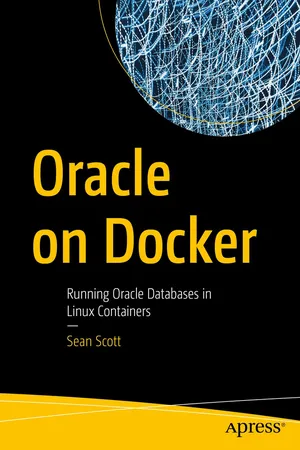
- English
- ePUB (mobile friendly)
- Available on iOS & Android
eBook - ePub
About this book
Discover the benefits of running Oracle databases in Linux containers. This book approaches containers from the perspective of database administrators, developers, and systems administrators. It explains the differences between containers and virtual machines and describes why containers deliver greater speed, flexibility, and portability, with lower resource requirements. You'll learn how running Oracle databases in containers complements existing database infrastructure and accelerates development, and you'll understand the advantages they offer for test and validation environments.
This book teaches you how to begin working with Oracle databases in Docker, covering the steps for preparing and installing software on Windows, Mac, and Linux systems. It describes the steps for deploying Oracle databases, separating data and configurations from database software, and networking and communicating with your containers. It introduces the Docker commands you'll use for managingcontainers, including tips and shortcuts to make everyday tasks easier. Databases have unique demands for performance and reliability, and this book addresses those qualities with discussions on protecting, persisting, and distributing data. Other books may overlook these topics and approach containers as disposable commodities in serverless environments or convenient coding platforms. You'll gain battle-tested insights for customizing and extending your containers to meet different needs.The opening chapters concentrate on the practical steps of running Oracle databases in Docker. Once you're comfortable with container terminology and methods, you'll look deeper at the real power behind containers—preparing and building images, and the templates that form the foundation beneath every container. You'll begin by modifying publicly available image manifests, or Dockerfiles, following multiple examples that add functionality and capabilities to your databases. You'lldiscover methods for using run-time options to create flexible and extensible images that adapt to real-world requirements.
Within the pages, you'll see how Oracle and Docker empower you to confidently build and deploy systems. It's written with databases and database users in mind and delivers practical advice based on the author's real-world, battle-tested experiences deploying and running Oracle databases in containers since 2014. With Oracle databases in containers, database administrators have the ideal platform for evaluating performance, practicing database upgrades and migrations, validating backup and recovery processes, and hardening environments. Developers will find that the marriage of Oracle and Docker simplifies code and application tests. Docker's unique ability to isolate data artifacts improves reliability and confidence in test and QA processes. If you're a database administrator, this book will help you join the container revolution sweeping the industry and making IT professionals more productive than ever!
What You Will Learn
- Recognize when and why to use containers for an Oracle database
- Understand container terminology and architecture
- Create and customize Oracle databases in containers
- Build and extend images and containers for multiple uses
- Store and persist data beyond the container ecosystem
- Use popular database tools with databases in containers
- Explore container networking and connect multiple container databases
- Manage, monitor, and secure containers
- Write Dockerfiles to support custom requirements
- Package and deploy data artifacts that accelerate development, test, and QA activities
Who This Book Is For
Database administrators, developers, and systems administrators who want to be more productive by running Oracle databases in Linux containers
Tools to learn more effectively

Saving Books

Keyword Search

Annotating Text

Listen to it instead
Information
Table of contents
- Cover
- Front Matter
- Part I. Introduction to Containers
- Part II. Building and Customizing Images
- Part III. Appendixes
- Back Matter
Frequently asked questions
Yes, you can cancel anytime from the Subscription tab in your account settings on the Perlego website. Your subscription will stay active until the end of your current billing period. Learn how to cancel your subscription
No, books cannot be downloaded as external files, such as PDFs, for use outside of Perlego. However, you can download books within the Perlego app for offline reading on mobile or tablet. Learn how to download books offline
Perlego offers two plans: Essential and Complete
- Essential is ideal for learners and professionals who enjoy exploring a wide range of subjects. Access the Essential Library with 800,000+ trusted titles and best-sellers across business, personal growth, and the humanities. Includes unlimited reading time and Standard Read Aloud voice.
- Complete: Perfect for advanced learners and researchers needing full, unrestricted access. Unlock 1.4M+ books across hundreds of subjects, including academic and specialized titles. The Complete Plan also includes advanced features like Premium Read Aloud and Research Assistant.
We are an online textbook subscription service, where you can get access to an entire online library for less than the price of a single book per month. With over 1 million books across 990+ topics, we’ve got you covered! Learn about our mission
Look out for the read-aloud symbol on your next book to see if you can listen to it. The read-aloud tool reads text aloud for you, highlighting the text as it is being read. You can pause it, speed it up and slow it down. Learn more about Read Aloud
Yes! You can use the Perlego app on both iOS and Android devices to read anytime, anywhere — even offline. Perfect for commutes or when you’re on the go.
Please note we cannot support devices running on iOS 13 and Android 7 or earlier. Learn more about using the app
Please note we cannot support devices running on iOS 13 and Android 7 or earlier. Learn more about using the app
Yes, you can access Oracle on Docker by Sean Scott in PDF and/or ePUB format, as well as other popular books in Computer Science & Databases. We have over one million books available in our catalogue for you to explore.